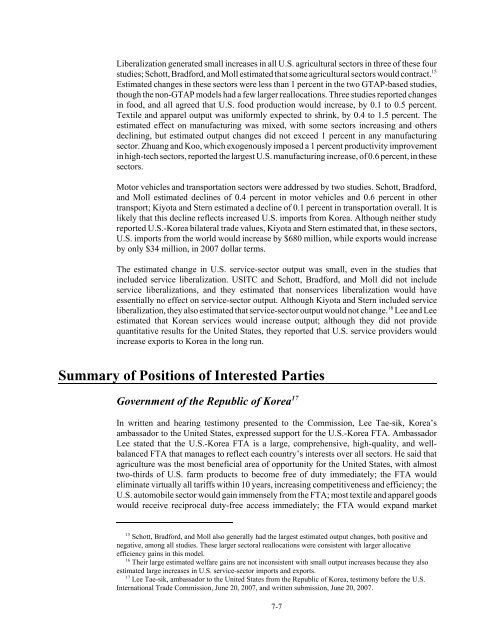U.S.-Korea Free Trade Agreement: Potential Economy-wide ... - USITC
U.S.-Korea Free Trade Agreement: Potential Economy-wide ... - USITC
U.S.-Korea Free Trade Agreement: Potential Economy-wide ... - USITC
Create successful ePaper yourself
Turn your PDF publications into a flip-book with our unique Google optimized e-Paper software.
Liberalization generated small increases in all U.S. agricultural sectors in three of these four<br />
studies; Schott, Bradford, and Moll estimated that some agricultural sectors would contract. 15<br />
Estimated changes in these sectors were less than 1 percent in the two GTAP-based studies,<br />
though the non-GTAP models had a few larger reallocations. Three studies reported changes<br />
in food, and all agreed that U.S. food production would increase, by 0.1 to 0.5 percent.<br />
Textile and apparel output was uniformly expected to shrink, by 0.4 to 1.5 percent. The<br />
estimated effect on manufacturing was mixed, with some sectors increasing and others<br />
declining, but estimated output changes did not exceed 1 percent in any manufacturing<br />
sector. Zhuang and Koo, which exogenously imposed a 1 percent productivity improvement<br />
in high-tech sectors, reported the largest U.S. manufacturing increase, of 0.6 percent, in these<br />
sectors.<br />
Motor vehicles and transportation sectors were addressed by two studies. Schott, Bradford,<br />
and Moll estimated declines of 0.4 percent in motor vehicles and 0.6 percent in other<br />
transport; Kiyota and Stern estimated a decline of 0.1 percent in transportation overall. It is<br />
likely that this decline reflects increased U.S. imports from <strong>Korea</strong>. Although neither study<br />
reported U.S.-<strong>Korea</strong> bilateral trade values, Kiyota and Stern estimated that, in these sectors,<br />
U.S. imports from the world would increase by $680 million, while exports would increase<br />
by only $34 million, in 2007 dollar terms.<br />
The estimated change in U.S. service-sector output was small, even in the studies that<br />
included service liberalization. <strong>USITC</strong> and Schott, Bradford, and Moll did not include<br />
service liberalizations, and they estimated that nonservices liberalization would have<br />
essentially no effect on service-sector output. Although Kiyota and Stern included service<br />
liberalization, they also estimated that service-sector output would not change. 16 Lee and Lee<br />
estimated that <strong>Korea</strong>n services would increase output; although they did not provide<br />
quantitative results for the United States, they reported that U.S. service providers would<br />
increase exports to <strong>Korea</strong> in the long run.<br />
Summary of Positions of Interested Parties<br />
Government of the Republic of <strong>Korea</strong> 17<br />
In written and hearing testimony presented to the Commission, Lee Tae-sik, <strong>Korea</strong>’s<br />
ambassador to the United States, expressed support for the U.S.-<strong>Korea</strong> FTA. Ambassador<br />
Lee stated that the U.S.-<strong>Korea</strong> FTA is a large, comprehensive, high-quality, and wellbalanced<br />
FTA that manages to reflect each country’s interests over all sectors. He said that<br />
agriculture was the most beneficial area of opportunity for the United States, with almost<br />
two-thirds of U.S. farm products to become free of duty immediately; the FTA would<br />
eliminate virtually all tariffs within 10 years, increasing competitiveness and efficiency; the<br />
U.S. automobile sector would gain immensely from the FTA; most textile and apparel goods<br />
would receive reciprocal duty-free access immediately; the FTA would expand market<br />
15 Schott, Bradford, and Moll also generally had the largest estimated output changes, both positive and<br />
negative, among all studies. These larger sectoral reallocations were consistent with larger allocative<br />
efficiency gains in this model.<br />
16 Their large estimated welfare gains are not inconsistent with small output increases because they also<br />
estimated large increases in U.S. service-sector imports and exports.<br />
17 Lee Tae-sik, ambassador to the United States from the Republic of <strong>Korea</strong>, testimony before the U.S.<br />
International <strong>Trade</strong> Commission, June 20, 2007, and written submission, June 20, 2007.<br />
7-7

















